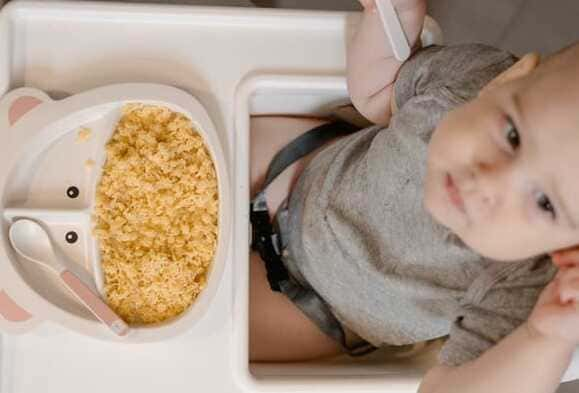Welcoming a new member into the family brings boundless joy and a flurry of questions, especially for first-time parents. One common inquiry that arises is, “When should I introduce solid foods to my baby?” Understanding this milestone is important as it marks the beginning of a new phase in your child’s development, a transition that shows your baby is growing more independent and has expanding nutritional needs.
Understanding the Basics: Nutrition for Infants
The Importance of Breast Milk or Formula
During the initial 6 months of life, breast milk provides the essential nutrients for your baby’s growth and development. Breast milk, in particular, offers a perfect blend of proteins, fats, carbohydrates, and antibodies, tailored to meet your baby’s nutritional needs. However, as your little one grows, their nutritional requirements evolve, prompting the introduction of complementary foods.

Why Solid Foods Become Necessary
Around the 4-6 month mark, several nutritional factors necessitate the introduction of complementary foods:
- Depleting iron stores: Babies are born with iron reserves that generally begin diminishing around 4-6 months
- Increased caloric requirements: Growing bodies demand more energy than milk alone can efficiently provide
- Developmental needs: Exposure to varied tastes and textures supports oral motor development
- Nutrient diversification: Certain vitamins and minerals become increasingly important as babies grow
Signs Your Baby is Ready for Solid Foods
Every child is unique, and readiness for solid foods may vary. However, certain signs indicate that your baby might be prepared to explore beyond milk:
Head and Neck Control: Your baby should be able to hold their head steady and sit upright with support.
Curiosity: Showing interest in what you are eating, reaching for your food, or mimicking chewing motions.
Tongue Thrust Reflex: Gradual disappearance of the reflex that pushes food out of the mouth with the tongue.
Increased Appetite: If your baby seems unsatisfied with breast milk alone, it might be a cue to introduce solids.
Sitting Ability: They can sit upright with minimal support.
Weight gain: Has doubled birth weight (typically around 4-6 months)
The Recommended Age
Traditionally, pediatricians suggest starting solids around 4 to 6 months of age. At this stage, babies’ digestive systems are more mature, and they can typically handle a variety of foods. However, it is crucial to consult your pediatrician before initiating this transition. They can provide personalized guidance based on your baby’s growth and development.
Introducing Solids
When commencing solid foods, start with foods that are easy to digest and less likely to cause allergies. Rice cereal or oatmeal is often recommended as a first food because of its mild flavor and smooth texture. Single-ingredient purees or mashed foods, such as cooked carrots, bananas, or sweet potatoes are some other popular choices. Iron-rich foods, such as fortified cereals, pureed meats, and legumes, become important as your baby’s iron stores from birth begin to diminish. Introduce one new food at a time, waiting a few days before introducing another. This approach allows you to monitor for any allergic reactions or sensitivities.
 |  |
|---|
Best First Foods for Babies
When beginning the solid food journey, single-ingredient foods are ideal as they allow you to identify potential allergic reactions easily. Consider these nutritious first foods:
Iron-Rich Foods (Important First Choices)
- Iron-fortified infant cereals (rice, oatmeal, barley)
- Pureed meat (beef, dark chicken, turkey)
- Pureed legumes (lentils, beans)
Nutrient-Dense Vegetables
- Sweet potatoes
- Carrots
- Peas
- Avocado (technically a fruit but less sweet)
Mild Fruits
- Bananas
- Applesauce (unsweetened)
- Pears
- Peaches
Progression and Texture
As your baby grows accustomed to purees, gradually introduce thicker textures and finger foods. Encourage self-feeding by offering small, soft pieces of fruits, vegetables, or cooked pasta. Remember to supervise your baby closely during mealtime to ensure safe eating practices.
Patience and Persistence
Introducing solids is a gradual process that requires patience and persistence. It is normal for babies to reject new foods or make faces at unfamiliar tastes. Do not be discouraged; continue offering a variety of nutritious foods, and eventually, your little one will develop preferences and expand their palate.
How to Transition from Breast Milk to Solid Foods
The transition to solids is gradual, not abrupt:
- First phase (6 months): Solids are complementary, with breast milk/formula still providing 90% of nutrition
- Middle phase (7-9 months): Increase solid food variety and frequency while maintaining regular milk feedings
- Later phase (10-12 months): Establish more structured meal and snack times, with milk feedings becoming more supplemental
Practical Tips:
- Offer breast/formula first at some feedings and after solids at others
- Gradually increase the thickness and texture of foods
- Follow baby’s interest in solids, some days they will want more, others less
- Maintain responsiveness to hunger and fullness cues
Common Mistakes When Introducing Solid Foods
Understanding potential pitfalls helps ensure a positive feeding experience:
- Starting too early: Introducing solids before 4 months increases allergy and choking risks
- Delaying too long: Waiting beyond 6-7 months may lead to feeding difficulties
- Rushing the process: Moving too quickly through textures or amounts can overwhelm babies
- Focusing on quantity: The initial goal is exposure and learning, not caloric intake
- Offering juice or sweetened foods: These can develop preferences for sweet tastes
- Skipping allergens entirely: Current guidelines recommend introducing common allergens (under medical supervision)
- Using food as a sleep aid: This can create unhealthy associations with eating
- Neglecting hunger cues: Forcing food can create negative feeding relationships
Conclusion
Feeding your baby solid foods marks an exciting and important milestone in their growth and development. By observing signs of readiness, consulting with your pediatrician, and offering nutrient-rich foods, you can help your baby develop a positive relationship with food from an early age. Remember, each child progresses at their own pace, so trust your instincts and enjoy this time of nourishment and exploration.
Remember that this time is as much about learning healthy eating habits as it is about nutrition. Create positive, pressure-free mealtimes that allow your baby to explore at their own pace. Each mess, funny face, and new food acceptance is part of their developmental process.